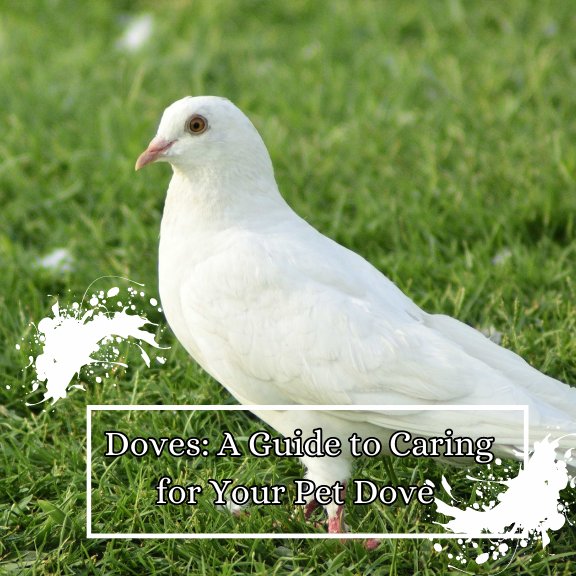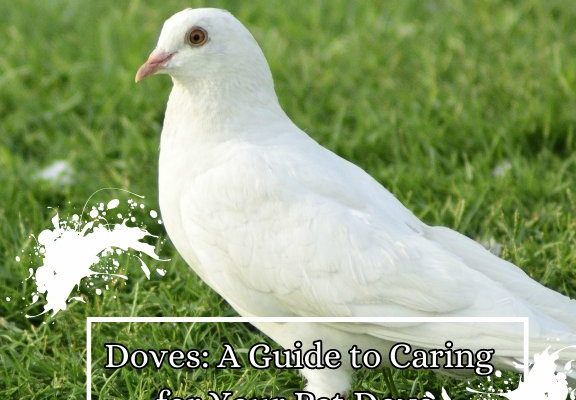
Imagine watching a dove coo softly on your windowsill while you sip your morning coffee. Their sweet sounds and pretty plumage can add beauty to any space. However, it’s essential to know what you’re getting into before bringing one home. In this article, we’ll look closely at whether doves are good pets by examining their behavior, how to handle them properly, and what kind of care they need on a daily basis.
Doves are often seen as symbols of peace and love, and they tend to reflect these qualities in their temperament. Generally, they are gentle and calm birds. Unlike some other pets that might be hyperactive or skittish, doves usually have a laid-back demeanor. They’re social creatures that thrive on companionship, whether it’s with other doves or with humans.
You might be wondering, do doves get along with everyone? The answer is yes, for the most part. They’re usually friendly and can form strong bonds with their owners. It’s not unusual to see a dove snuggle up to someone they trust. However, like any animal, their personality can vary. Some doves may be more shy or reserved. Spending time with them and learning their signals can help you gauge their mood and needs.
Another thing to consider is that doves are not as vocal as other pets. Instead of barking or meowing, they communicate with soft coos. This can be soothing, but it also means that their sweet sounds might blend into the background of your daily life. If you’re looking for a chatty companion, you might want to explore other options. But if you appreciate a calm, quiet pet, doves might just be perfect for you.
Handling doves requires a gentle touch and a little patience. Since they are delicate creatures, you want to ensure that any interaction is comfortable for both you and your bird. The first step in handling your dove is to build trust. Spend some time sitting calmly near their cage, allowing them to observe you. This helps them feel safe.
When you’re ready to pick up your dove, do so slowly and gently. You can use both hands to cup them, with one hand supporting their body and the other covering their back. Avoid grabbing or forcing them, as this can frighten them. If your dove seems resistant, give them time. It’s all about creating a bond, and patience is key.
If you have children or other pets, teach them about gentle handling. Doves are not toys; they’re living creatures with feelings. Show kids how to approach doves calmly and how to recognize when a dove is stressed. It’s essential for everyone in your household to understand how to interact respectfully with your new pet.
Taking care of doves is pretty straightforward, but it does require commitment. Doves need a balanced diet, a clean environment, and regular social interaction to thrive. Let’s break it down:
- Diet: A proper diet is crucial. Doves primarily eat seeds, pellets, and fresh greens. You can find specific dove food at pet stores, which is enriched with the necessary nutrients. Make sure to provide fresh water daily, as hydration is vital.
- Cage Setup: Their living space should be spacious enough for them to move around comfortably. A cage with horizontal bars will allow them to climb and exercise. Keep it clean by changing the bedding and removing any leftover food regularly.
- Social Interaction: Doves are social birds. They need time out of their cage every day—at least a couple of hours—to explore and bond with you. You might even consider getting a second dove for companionship, as they can form strong social bonds with each other.
A little effort goes a long way in keeping your dove happy and healthy. Think of it as creating a mini paradise for them. It’s about providing a safe, comfortable environment where they can thrive.
Like any pet, doves can face health challenges. It’s important to be aware of common issues so you can catch them early. One of the most frequent problems is respiratory infections. Signs include sneezing, coughing, or a runny nose. If you notice any of these symptoms, consulting a veterinarian experienced with birds is crucial.
Another issue can be obesity, often caused by an improper diet. It’s easy to overfeed them, especially if they look adorable asking for food. Stick to the recommended servings and keep an eye on their weight. A well-balanced diet is essential for their overall health.
Lastly, be on the lookout for behavioral changes. If your dove seems lethargic, isn’t eating as usual, or is acting differently, it could be a sign they’re not feeling well. Observing your dove’s behavior closely can help you catch any problems early on.
Doves are intelligent and curious creatures, so keeping their environment stimulating is important. You can enrich their lives with toys and activities that encourage exploration and play. Simple items like mirrors, swings, and chewable toys can keep them entertained. Changing their toys regularly can also spark their interest and keep boredom at bay.
Another great way to enrich your dove’s environment is by allowing supervised outdoor time. Just like us, they enjoy a change of scenery! A safe outdoor aviary, or a bird-safe area in your garden, can let them stretch their wings and enjoy natural sunlight. Just be cautious of predators and ensure they are supervised during this time.
If you want to take it a step further, consider training your dove. Doves can learn simple commands with patience and treats, like flying to your hand. This not only provides mental stimulation but also strengthens your bond.
You might be asking, “Why should I consider keeping doves as pets?” Well, they come with several unique advantages. First, their calm nature makes them ideal for households seeking a quieter, more peaceful pet. If you live in a smaller space or an apartment, doves can fit in nicely without making too much noise.
Additionally, they are relatively low-maintenance compared to other pets. Doves require less grooming and can often entertain themselves. Plus, their gentle demeanor makes them great companions for children when properly handled.
Lastly, doves are beautiful creatures. Their soft feathers and graceful movements can bring a unique aesthetic to your home. Imagine your guests being greeted by the sight of a pair of doves, gently cooing in their cage. It’s a lovely way to add a touch of nature to your living space.
In conclusion, doves can make wonderful pets if you’re willing to invest time and care into their well-being. Their gentle temperament, unique beauty, and relatively low maintenance make them an appealing choice for many. As long as you’re prepared to nurture your bond and meet their needs, you’ll likely find that sharing your life with a dove is a fulfilling and joyful experience. So, if you’re looking for a pet that embodies peace and tranquility, maybe it’s time to consider welcoming a dove into your home.

